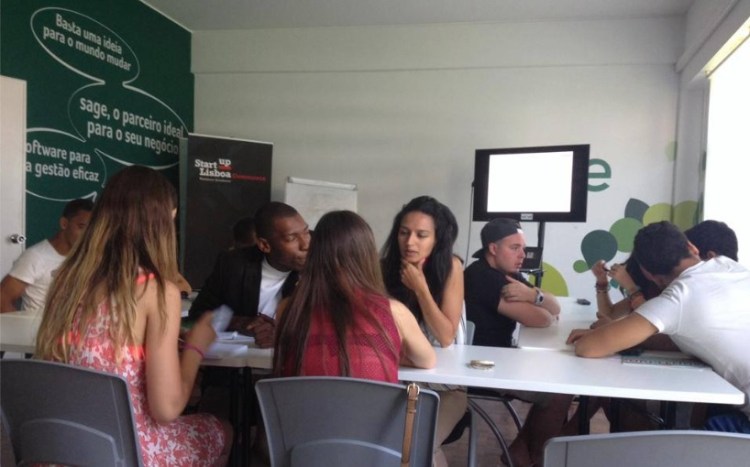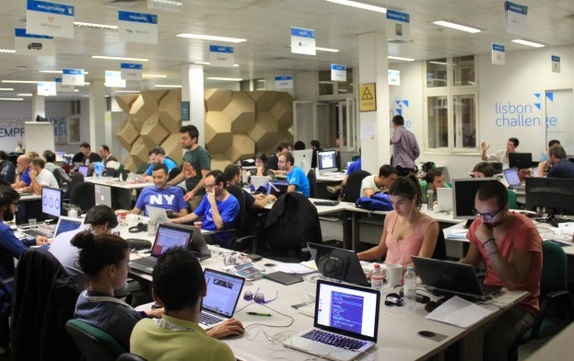Forgive me for boasting, but Portugal has always been a magical place, a country full of rich history, beautiful architecture, and amazing food and wine. We also offer a good quality of life, an advanced educational system with free and compulsory schooling until the age of 18, and a cost of living that is much lower than in other European countries. This symbiosis of character, history, and a modern way of life is, I’m convinced, helping to drive Portugal’s growing startup scene.
Portugal is, in short, a place to be inspired.
To be fair, the current entrepreneurial boom was initially the result of several dismal years for Portugal’s economy. But the upside of the downturn was more young people choosing to take a chance on starting their own company. Faced with a rising unemployment rate, these young entrepreneurs have been finding inspiration in the real world, recognizing needs in the marketplace, and applying creative solutions. The result has been an explosion of startups, and a rising GDP, up 1.6 percent this year and .9 percent in 2014, after several years in recession.
To help boost entrepreneurship even more, the Portuguese government created an investment agency called Portugal Ventures, a €450 million fund focusing on investments in innovative, scientific, and technology-based companies as well as in companies from the more traditional Portuguese tourism and industrial sectors.
A number of startup incubators have also mobilized, offering new businesses an office or desk to get them off the ground. Startup Lisboa, for example, one of the largest incubators in the country, hosts around 80 startups at any one time from various areas of business, from tech to tourism and everything in between.
Up north there’s Startup Braga, which has partnered with Microsoft Ventures to focus on pre-acceleration, acceleration, and incubation programs for startups with global growth ambitions.
The Lisbon Challenge is recognized as the fourth most active accelerator program in Europe by Fundacity, promoting growth and internationalization. In just three years, it has sent three alumni to Y Combinator, two alumni to Seedcamp, and one to TechStars. Forty percent of the companies coming out of Lisbon Challenge have secured investment, and one has been acquired.
While it’s impossible to list every innovative and exciting Portuguese startup, I’d like to highlight a few of the hottest to watch for this year:
Unbabel, is a clever Y Combinator-backed web translation service that combines machine learning and human crowdsourcing. The combination of artificial and human intelligence delivers faster translations with human quality. Businesses are able to use this service by requesting translations via Unbabel’s web order form, email, API, or by integrating it into their daily workflow with Zendesk and Mailchimp. Using machine translation in its service also means huge cost savings. Unbabel estimates it has saved businesses customers $2 million on their translation needs. The Unbabel team takes advantage of its proximity to amazing Lisbon beaches by going surfing every Wednesday!
Cuckuu is a unique alarm clock app that uses social motivation to encourage users to experience life together. Users are able to create their own alarms, called Cuckuus, and follow friends, family, and other users. Cuckuu’s founders, Joao Jesus, Christophe De Weerdt, and Peu Fraga, want to help people connect and motivate one another to do things through fun and social interactions.
PharmAssistant has developed a SmartBottle for pills, a connected device that has a built-in visual and audible alarm when it’s time for the user to take medication. An included app can even analyze medication patterns and detect any possible adverse interactions between the medicines in the unit. The company also offers an optional monitoring service so a family member or healthcare professional will be able to remotely monitor if the user is taking his or her medication on time and according to the doctor’s prescription. Last September 2014, PharmAssistant was awarded a €50,000 grant from major pharmaceutical company Bayer.
MagniFinance offers a financial management platform for small and medium-sized businesses that makes day-to-day management lighter and financial planning more precise. The service helps companies reduce the time managing their finances to just five minutes a day. In addition to the time savings, this system also automatically synchronizes different bank accounts, allowing businesses to issue invoices, check lists of suppliers, and track expenses and revenues while predicting future values. In 2014, MagniFinance was one of the finalists of the International Acceleration Program Lisbon Challenge and won the Caixa Entrepreneurship Award, receiving an investment of €100,000 from Caixa Capital.
Popcorn Metrics spent a year developing a platform that integrates web analytics tools without having to write a line of code. Up until now, managers and marketers who wanted to better understand the behavior of users on their sites had to either work with code themselves or have an IT person do it for them. Cofounder Paul Boyce is an Irish national who left a career in IT to create his own company. He fell in love with Portugal while on holiday and chose to set up his new business in Lisbon. He met partner Luís Correia at a startup event and together they developed Popcorn Metrics.
The past three years have been an incredibly exciting time for Portugal’s startup scene. I believe this is a trend that will continue.
Pedro Rocha Vieir is cofounder, president, and CEO of Beta-i, a non-profit focused on promoting entrepreneurship in Portugal.
VentureBeat's mission is to be a digital town square for technical decision-makers to gain knowledge about transformative enterprise technology and transact. Learn More


